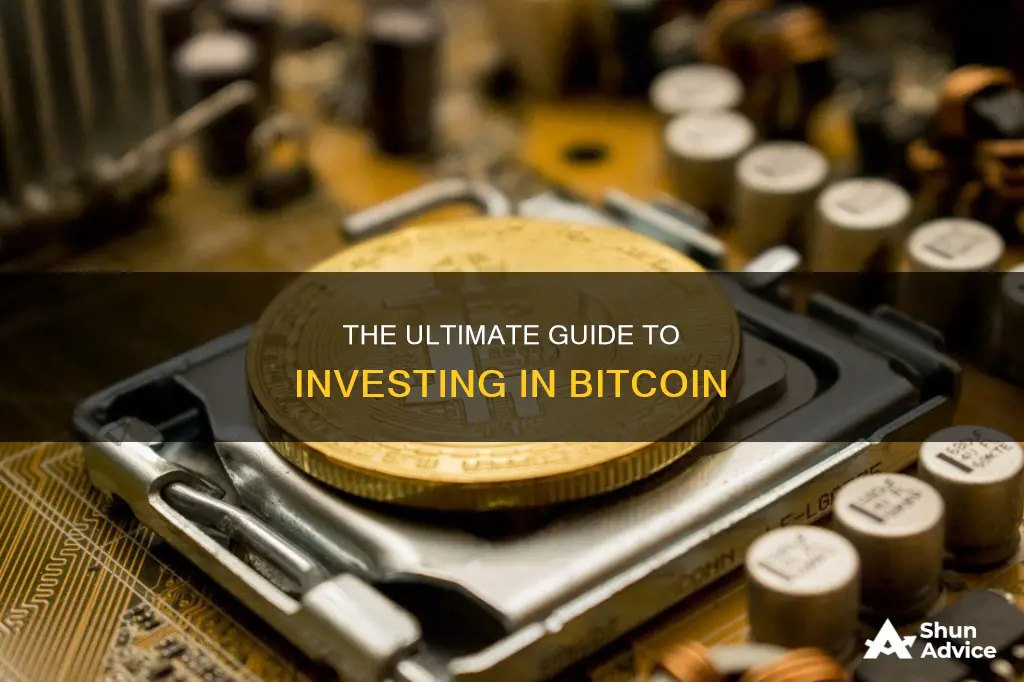
Bitcoin is a well-known cryptocurrency that has become increasingly popular among investors in recent years. It is a decentralised currency that utilises blockchain technology to track and verify asset ownership.
There are several ways to invest in Bitcoin, each with its own advantages and disadvantages. Here are some of the most common methods:
- Cryptocurrency Exchanges: These are platforms that allow you to buy and sell Bitcoin and other cryptocurrencies. Examples include Coinbase, Kraken, Gemini, and Binance. When choosing an exchange, consider factors such as fees, security, and the range of cryptocurrencies offered.
- Traditional Stockbrokers: A few traditional brokers, such as Robinhood, Webull, TradeStation, and Fidelity, offer their customers the ability to buy and sell Bitcoin.
- Money Transfer Apps: Cash transfer services like PayPal, Venmo, or Cash App allow users to purchase, store, send, and sell Bitcoin directly through their apps.
- Bitcoin ATMs: These machines function like regular ATMs but allow you to buy and sell Bitcoin with cash. They are often placed in locations such as convenience stores.
- Bitcoin Exchange-Traded Funds (ETFs): A Bitcoin ETF tracks the price of Bitcoin and trades over major exchanges. This option was approved by the Securities and Exchange Commission in 2024, making it easier for traditional investors to gain access to Bitcoin.
Before investing in Bitcoin, it is important to understand the risks involved. Bitcoin is a highly volatile and risky asset, prone to large and fast swings in value. It is not backed by any physical asset or central regulator, and its value is dependent on market demand. Additionally, Bitcoin and other cryptocurrencies are susceptible to hacking and pump-and-dump schemes.
It is crucial to do your own research, carefully assess your risk tolerance, and only invest what you can afford to lose.
| Characteristics | Values |
|---|---|
| How to invest | Choose a crypto-trading service or venue, connect with a payment method, place an order, and ensure stable storage for purchased cryptocurrency |
| Where to buy | Cryptocurrency exchanges, brokerage firms, and payment services like PayPal. Dedicated cryptocurrency exchanges include Coinbase, Gemini, Kraken, and Binance. You can also buy Bitcoin through other financial and brokerage accounts, such as Robinhood, SoFi, and the Cash app from Square |
| How to store | Hot wallets and cold wallets |
| Risks | Bitcoin is a very high-risk investment because it’s a volatile asset. Its value may rise or fall dramatically in a very short period. It is also susceptible to government actions and hacking |
| Pros | Relatively easy to buy, offers an alternative currency and investment strategy, secure |
| Cons | Highly risky and volatile, potential for hacks and other losses, requires some level of technical knowledge |
What You'll Learn

Choosing a Bitcoin exchange
- Authenticity and Security: Research the exchange to determine its legitimacy and security protocols. Check its reputation and the various security measures it has in place to protect your data and funds.
- Payment Methods: Understand the method of purchasing cryptocurrencies on the platform. Some exchanges support bank transfers, PayPal, credit and debit cards, while others only accept cryptocurrency for purchases. Choose an exchange that suits your preferred payment method.
- Supported Coins and Tokens: While most exchanges support Bitcoin and Ethereum, there are thousands of other cryptocurrencies. If you want to invest in coins beyond Bitcoin and Ethereum, select an exchange that offers a wide range of cryptocurrencies.
- Transaction Fees: Understand the fee structure of the exchange. Choose a platform with transparent and competitive fees, and avoid exchanges with hidden transaction costs.
- User Interface and Experience: Opt for an exchange with an intuitive interface that makes trading cryptocurrencies easier. Also, consider the customer service and other customer-related functionalities offered by the exchange.
Some popular cryptocurrency exchanges include Binance, Coinbase, Kraken, and Crypto.com. These exchanges offer a wide range of cryptocurrencies, robust security measures, and user-friendly platforms. However, it is important to conduct your own research and compare different exchanges to find the one that best suits your needs.
Shiba Inu Coin: Safe Investment or Risky Business?
You may want to see also

Understanding hot and cold wallets
Hot and cold wallets are the primary means of storing and exchanging cryptocurrencies and tokens. They are essential for keeping the keys to your digital cash safe.
Hot Wallets
Hot wallets are connected to the internet through your computer or phone, making them easily accessible for regular transactions and trading. They are a popular choice for crypto owners due to their convenience and ease of use. Hot wallets are typically software-based and installed on devices like smartphones or laptops. They store your private keys online, allowing you to access and manage your cryptocurrencies. Examples of hot wallets include MetaMask, Coinbase Wallet, and Edge Wallet.
However, because hot wallets are always online, they are more vulnerable to hacking and phishing attacks. It is crucial for users of hot wallets to implement additional security measures such as strong passwords, encryption, and multi-factor authentication.
Cold Wallets
Cold wallets, on the other hand, are hardware-based and keep your data offline. They are physical devices, often resembling thumb drives or USB sticks, that store your private keys offline. Cold wallets are considered one of the safest methods for securing digital currency as they are less susceptible to online hacks or theft. Examples of cold wallets include hardware wallets like Trezor, Ledger, and KeepKey, as well as paper wallets.
The main drawback of cold wallets is their lack of convenience for regular transactions. To use cryptocurrencies stored in a cold wallet, you need to connect it to an online device, transfer the necessary amount to a hot wallet, and then make your transaction. Additionally, cold wallets can be lost, stolen, or damaged, so it is important to keep them secure.
Choosing Between Hot and Cold Wallets
The choice between a hot and cold wallet depends on individual needs and preferences. If you frequently transact with cryptocurrencies, a hot wallet may be more suitable due to its convenience. On the other hand, if you prioritise security and long-term storage, a cold wallet would be the better option. Many people use a combination of both, storing smaller amounts in a hot wallet for regular transactions and keeping larger amounts in a cold wallet for long-term storage.
Rare Coins: High-Risk, High-Reward Investments
You may want to see also

Buying fractions of a Bitcoin
You don't have to buy a whole Bitcoin to own Bitcoin; you can buy a fraction of a Bitcoin. The smallest unit of value in Bitcoin is called a 'satoshi', and there are 100,000,000 satoshis in a Bitcoin. This means you can own 0.00000001 BTC and still "own Bitcoin". At the current value of Bitcoin, one satoshi would cost you $0.00008.
There are a few ways to buy fractions of a Bitcoin. One way is to use a cryptocurrency exchange such as Coinbase, Gemini, Kraken, or Crypto.com. These exchanges offer a variety of cryptocurrencies and carry different fees and consumer protections, so it's important to do your research before choosing one. Another way to buy fractions of Bitcoin is through a traditional stockbroker like Robinhood, Webull, TradeStation, or Fidelity. These brokers typically charge no fees for Bitcoin trades. You can also purchase Bitcoin using peer-to-peer money transfer apps like PayPal, Venmo, or Cash App, or through a Bitcoin ATM.
When buying fractions of a Bitcoin, there are a few things to keep in mind. First, exchanges usually won't deal with buy orders of less than $5, so you'll need to buy at least that amount. Second, there are fees involved in buying Bitcoin, including transaction fees and exchange fees, which can add up. Finally, it's important to find a secure way to store your Bitcoin, such as a hot wallet or a cold wallet.
Overall, buying fractions of a Bitcoin can be a good way to get started with cryptocurrency investing, but it's important to understand the risks and potential losses involved.
Gold Coin Investment: Where to Buy?
You may want to see also

The risks of investing in Bitcoin
Bitcoin is the most successful virtual currency today, but as with any new frontier, there are some serious risks when it comes to investing in it. Here are some of the key risks to be aware of:
Volatile and Fluctuating Market
The price of bitcoin is constantly changing, and with such an unpredictable market, there’s no guarantee of a return on your investment. For example, on 6 November 2018, one bitcoin was worth $6,461.01. 11 days later, on the 17th, the price topped $20,000. By 24 December, buyers could not sell their investment for more than $14,626. To avoid a massive loss, it is recommended to keep a vigilant eye on the market and make small investments.
Cyberattacks and Fraud
Bitcoin is technology-based, which leaves this investment open to cyberattacks and fraud. Hacking is a serious risk since there is no way to retrieve lost or stolen bitcoins. Many reports suggest that many buyers lose their investments on exchanges and mining losses. Additionally, there is a fair amount of fraud in the bitcoin market, with fake exchanges duping unsuspecting investors out of their bitcoins.
Little or No Regulation
The bitcoin market is currently operating with little to no major regulations. The government doesn’t have a clear stance on cryptocurrency as the market is still very new. It is not taxed, which can make it enticing as an investment opportunity, but a lack of taxation could lead to problems should bitcoin pose competition for government currency. There’s no telling what the state of the bitcoin market could be in a few years’ time.
Technology Reliance
Bitcoin is an online exchange that is entirely reliant on technology. Coins are digitally mined, exchanged via smart wallet and kept in check using various systems. Without that technology, cryptocurrency is worthless. With no physical collateral to back it up, bitcoin owners are more vulnerable to cyberthreats, online fraud, and a system shutdown.
Block Withholding
New bitcoins are created by solving mathematical equations called “blocks”. A mining pool can use computational power to mine a block and hide it from honest miners instead of reporting the new block to the network. This allows a select few to reap the benefits, while others are left with nothing.
A Guide to Investing in Verge Coin: India's Prospects
You may want to see also

How to manage your Bitcoin investments
Once you have purchased Bitcoin, you will need to decide how to manage your investment. Here are some key steps and considerations to help you effectively manage your Bitcoin investments:
- Choose a secure wallet: Select a secure digital wallet to store your Bitcoin. You can choose between a hot wallet, which is connected to the internet and offers faster transactions, or a cold wallet, which is offline and provides enhanced security. Examples of hot wallets include Electrum and Mycelium, while cold wallets include hardware devices such as Ledger Nano and Trezor.
- Monitor market trends and news: Stay informed about Bitcoin market trends, news, and developments. Keep an eye on price movements, industry announcements, regulatory changes, and other factors that can impact the value of your investment.
- Diversify your portfolio: Diversification is a key risk management strategy. Consider investing in other cryptocurrencies, such as Ethereum, Cardano, or Dogecoin, or explore other investment options like stocks, bonds, or real estate to spread your risk.
- Set investment goals and strategies: Define your investment goals, such as long-term wealth accumulation or short-term trading. Develop an investment strategy that aligns with your goals, whether it's buying and holding, day trading, or a combination of approaches.
- Manage risk and volatility: Bitcoin is a highly volatile asset. Consider setting stop-loss orders to limit potential losses and take profits at regular intervals to lock in gains. Diversification and risk management strategies can help you navigate market fluctuations.
- Stay informed about tax implications: Understand the tax implications of investing in Bitcoin. Consult with a tax professional to ensure you're complying with relevant regulations and reporting requirements in your jurisdiction.
- Regularly review and rebalance your portfolio: Periodically review your Bitcoin investments and overall portfolio allocation. Rebalance your portfolio as needed to maintain your desired level of risk and alignment with your investment goals.
- Consider long-term investment horizons: Bitcoin's value can fluctuate significantly in the short term. Maintaining a long-term investment horizon can help you ride out short-term volatility and focus on potential long-term gains.
- Stay updated with industry developments: Stay informed about advancements in blockchain technology, new use cases for Bitcoin, and emerging trends in the cryptocurrency space. This can help you make more informed investment decisions.
- Practice secure storage and backup solutions: Ensure your Bitcoin is securely stored and that you have reliable backup solutions in place. Utilize multiple forms of authentication and consider offline storage options to protect your investment from potential cyber threats.
Remember, investing in Bitcoin carries significant risks, and it's important to thoroughly understand the market and consult with financial professionals before making any investment decisions.
A Guide to Investing in Coinbase from India
You may want to see also
Frequently asked questions
You will need a secure internet connection, a cryptocurrency exchange account, personal identification documents, and a method of payment.
There are several factors to consider when choosing a Bitcoin exchange, including fees, the reputation of the exchange, and whether it supports transferring Bitcoin out of the brokerage account. Examples of dedicated cryptocurrency exchanges include Coinbase, Gemini, Kraken, and Binance.
A hot wallet is a wallet that’s operated by either your cryptocurrency exchange or by a provider. It is convenient because you’ll be able to access your coins through the internet or a software program. However, hot wallets are not the most secure form of coin storage. A cold wallet, on the other hand, is an actual piece of hardware that stores your coins, usually a portable device similar to a flash drive. Cold wallets are considered the safest storage method for your coins.
You can get started with most exchanges with as little as $5. At Coinbase, for example, you can buy as little as $2 of Bitcoin at a time.
Bitcoin is a very high-risk and volatile investment. Its value may rise or fall dramatically in a very short period. There is also a high risk of "pump-and-dump" schemes, where predatory investors reach out to amateur or unassuming investors and convince them to pour a lot of money into Bitcoin, causing the price to surge and then collapse.







